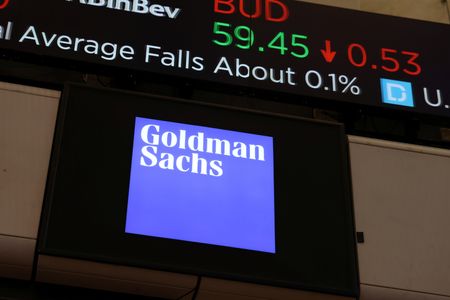By Iain Withers
CANNES, France (Reuters) – Goldman Sachs Asset Management will resume “actively investing” in U.S. commercial property this year because the market is bottoming out, its real estate head said, while other investors said the market downturn still had further to run.
Prices of U.S. offices and other commercial properties have fallen sharply in the face of higher interest rates and soaring vacancy rates that have outpaced other countries since the pandemic.
The plunge in prices has rattled confidence in U.S. regional banks with large exposure.
Investors gathered on the French Riviera this week for the MIPIM property conference, said the office sector would continue to struggle. A Brookfield Asset Management executive on Wednesday called the U.S. “the most oversupplied office market in the world” and said investors had taken on too much debt.
Jim Garman, GSAM’s head of real estate, said he saw a buying opportunity.
“The reason is a combination of interest rates coming down, we feel like the market is bottoming out, and because we’re starting to see a floor in prices set by buyers who are in the market,” Garman told Reuters at MIPIM.
Garman said GSAM, the asset management arm of Goldman Sachs, had begun to deploy more cash in real estate in Europe and Japan over the past three months, without quantifying its investment.
The underlying strength of the U.S. economy should support a rebound in the U.S. market too, although he cautioned about the speed of a recovery.
“We don’t think its going to be a very sharp V-shaped recovery – we think we’re going to bump along the bottom for a while, as a lot of these over-levered situations in the asset class get worked through,” he said.
British fund manager Schroders is also preparing to pounce. It plans to buy up U.S. commercial property in the billions of dollars over time and has begun hiring a team locally, with a focus on multi-family rental accommodation, its global head of real estate, Sophie van Oosterom, told Reuters.
Schroders has begun hiring a real estate team in the U.S. and is looking at various potential strategies, including potential acquisitions or buying stakes in local firms, van Oosterom said.
Speaking at a panel in Cannes earlier on Wednesday, executives said some parts of commercial real estate were holding up well, and clients were interested in investing in logistics and data centres rather than offices.
Blackstone’s global head of real estate debt capital markets, Michael Lascher, said that there was a polarisation in values between high-quality sustainable offices and the rest.
Plunging real estate values have raised concerns about a wider financial spillover should banks have to realise large losses on their property loans.
Regulators were putting a “clear focus” on CRE exposures at banks, said David Bouton, a senior commercial real estate executive at Citi.
But he said that lenders were more accommodating to investors than during the 2007-09 global financial crisis because they had higher capital buffers.
Others were also keen to play down comparisons with the global financial crisis.
Richard Spencer, GSAM’s head of real estate in Europe, the Middle East and Africa, said that banks today were in better shape with “the capital cushion to take action”.
(Reporting by Iain Withers; Writing by Tommy Reggiori Wilkes; Editing by Bernadette Baum, Alexandra Hudson and Nick Zieminski)

